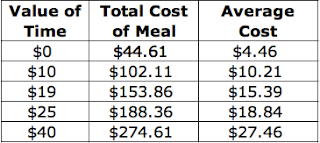 My darling wife found this article on the average cost of a meal at Thanksgiving and requested my analysis of the economics of Thanksgiving. Since I hate to deny her anything she wants, here are my thoughts:
My darling wife found this article on the average cost of a meal at Thanksgiving and requested my analysis of the economics of Thanksgiving. Since I hate to deny her anything she wants, here are my thoughts:As an economist, I wondered why people don't go out to eat on Thanksgiving and instead eat a large meal they prepare at home.
The article quotes a study that finds that a meal for 10 people costs $44.61 or about $4.50 per person which on the face of it seems pretty cheap. A good reason for eating in, as you can't get that quality of a meal at that price from a restaurant.
However, the study doesn't take into account the value of people's time. One recipe site recommends beginning your preparations at 10:45 am in order to eat at 5:30 pm. There are at least 2 hours of breaks in their cooking schedule but also, we need to add the time spent shopping for the specific Thanksgiving foods and clean up, which I'll estimate at 1 hour and 1 hour respectively. The total time for Thanksgiving cooking: 5 hours and 45 minutes.
Here are where some assumptions are going to be important. The less people enjoy cooking, the higher their time cost is going to be. Typically, the assumption is that people value their time at their wage rate (that being the opportunity cost). Below are some assumptions of people's value of time and their effect on the per person cost of the meal.

According to the Bureau of Labor Statistics, the average production worker earns just under $19 per hour. Earning $50,000 per year leads to an hourly wage of $25 per hour (working 40 hours a week, 50 weeks per year).
My guess is that to buy a comparable meal from a restaurant you'd have to pay at least $20 plus tip. These estimates seem to indicate that people who earn more $40 per hour (salary of $80,000 per year) would be made worse off by having to stay home and cook their own meals!
This clearly isn't the whole picture. People value time with the family and the special taste of their family recipes. Thanksgiving isn't inefficient for the rich because they enjoy the family time too. However, if Lincoln had added a second and a third Thanksgiving in March and July and I bet you'd see more people eating out.